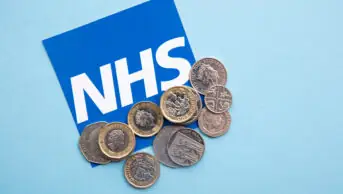
Carlton Reid / CC
More than a quarter of the money earmarked for the pharmacy integration fund (PhIF) was spent elsewhere in the NHS in 2018/2019, the government has admitted.
In response to a Freedom of Information (FOI) request submitted by The Pharmaceutical Journal, NHS England said that of the £40.0m budgeted for the fund in 2018/2019, just £28.7m was used for pharmacy initiatives through the scheme.
The government said that the remaining £11.3m “was spent on other NHS priorities”.
The Pharmaceutical Journal requested a line-by-line breakdown of what the fund was spent on (see Table); however, the response did not include how the money was spent in other areas of the NHS.
NHS England has said it is unable to determine where the £11.3m was spent, because it was subsumed into a larger pot of underspend funding and then distributed from there.
This is the third year the government has admitted underspending the fund. In 2016/2017, when the fund launched, NHS England committed to spending £2m through the PhIF. However, Steve Brine, the former pharmacy minister, said in June 2018 that £1.8m of that funding had been spent on other parts of the NHS.
Brine added that £21.8m of the £40.0m PhIF budget for 2017/2018 had also been used elsewhere.
This means that in the first three years of the PhIF, its pharmacy initiatives received just £47.2m (57.6%) of the budgeted £82.0m.
This comes after NHS England committed to distributing £300.0m through the fund in its first five years, when the PhIF was first announced in December 2015.
In its FOI response, NHS England said that it has “plans in place to invest in 2019/2020 in a similar way, building on the pilots established in 2018/2019”.
“There are provisions to spend up to £40m on those projects, with any underspend to be used towards other projects across the NHS,” it added.
Claire Anderson, chair of the Royal Pharmaceutical Society English Pharmacy Board said: “It’s disappointing to see this happening again.
“I welcome plans for the PhIF to support additional pilots for innovative services in the coming year, but unless the money gets through to where it’s needed, there’s a risk these are being set up to fail,” she added.
Of the £28.7m spent on pharmacy through the PhIF in 2018/2019, nearly half (£13.0m) was spent on the medicines optimisation in care homes scheme.
NHS England announced in February 2018 that it would be recruiting 240 pharmacy professionals into care homes for the scheme, using £20m from the PhIF.
In October 2018, The Pharmaceutical Journal was told that the new positions were expected to be filled by March 2019; however, as of May 2019, only 203 had been recruited and not all had started their jobs.
The scheme is set to be discontinued in March 2020, with the participating pharmacists to be re-employed by primary care networks (PCNs).
Some £6.33m of the PhIF was spent on NHS England’s clinical pharmacist programmes for both general practice and integrated urgent care.
These programmes were discontinued in April 2019, with the enrolled pharmacists transferred over to PCNs.
Meanwhile, the NHS urgent medicines supply advanced service pilot and the digital minor illness referral service, which have been subsumed into the community pharmacist consultation service, received a total of £1.7m in 2018/2019.
A spokesperson for NHS England told The Pharmaceutical Journal that the underspend was “rightly diverted to other NHS priorities in line with the ‘NHS Long Term Plan’”.
“The fund continues to have an impact for patients, delivering things such as the new community pharmacist consultation service and medicines reviews in care homes, and this year another £40m is available,” they added.
| Scheme | Spend |
|---|---|
Clinical pharmacists in general practice programme | £5.0m |
Medicines optimisation in care homes | £13.0m |
Clinical pharmacists in integrated urgent care | £1.3m |
NHS urgent medicines supply advanced service pilot | £1.4m |
Digital minor illness referral service | £0.4m |
Communications and engagement | £0.3m |
Integrating pharmacy and medicines optimisation pilots | £1.17m |
Evaluation | £0.7m |
Workforce development via health education England MOU | £4.8m |
Programme costs (staff and expenses) | £0.9m |
Total | £28.7m |


